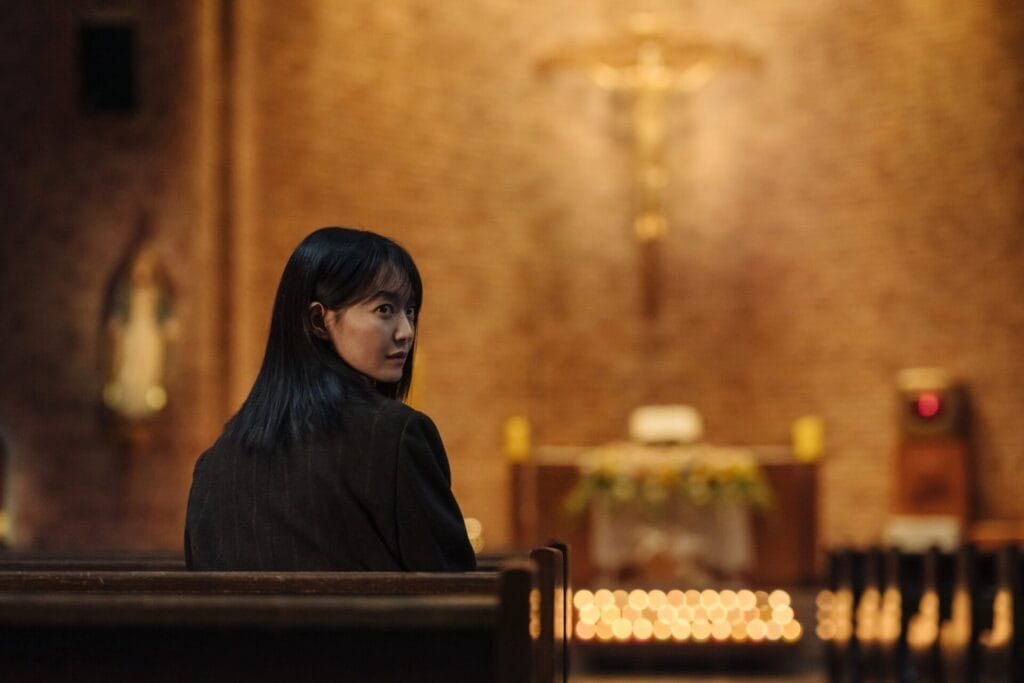“Karma” is a fresh thriller hailing from South Korea, delivering a strikingly realistic punch compared to other Korean productions. It presents well-developed main characters with compelling, profound, and dark personal narratives, all interwoven within a plot of murder, debt, and moral ambiguity.
The Korean entertainment industry pushes its boundaries with this dark and challenging thriller, aimed at an audience seeking more sophisticated storytelling and character development.
The Plot
A man, overwhelmed by crushing debt, decides to murder his father to cash in on the insurance. To carry out this grim plan, he hires another man to run him over. However, when the hit occurs, a woman witnesses the act, leading the police to suspect that there’s more to the story than meets the eye. This sets in motion an unexpected web of relationships involving six characters, all connected by this single event.

The Cast
To bring this intricate and shadowy story to life, the series boasts a cast of some of South Korea’s most acclaimed actors. Leading the ensemble is Park Hae-soo, who gained international recognition for his compelling role in the global hit “Squid Game.” His character’s life takes a dramatic turn after witnessing an accident and entering into an agreement that forces him to make morally questionable choices.
Starring alongside him is Shin Min-a, beloved for her roles in popular K-dramas like “Hometown Cha-Cha-Cha.” Here, she portrays Ju-yeon, a complex character grappling with trauma and insomnia. Ju-yeon’s past resurfaces when she encounters someone she hoped to never see again, compelling her to navigate the delicate balance between seeking revenge and finding forgiveness.
Lee Hee-joon, celebrated for his work in “A Killer Paradox,” plays The Debtor, a man who plunges into severe financial distress after a failed cryptocurrency investment and desperately tries to escape the clutches of loan sharks. Kim Sung-kyun, known for his versatility across various K-dramas, embodies Gil-ryong, a character facing the harsh reality of wrongful termination and the misfortune that follows. Lee Kwang-soo, a familiar face from “Running Man” and numerous acting roles, also stars. Completing the main cast is Gong Seung-yeon, who portrays Yu-jeong, the doctor’s girlfriend.
The Creator
The series is the brainchild of Lee Il-hyung, who not only penned the script but also took the reins as director. This dual role suggests a strong and unified vision for the series, where the writer’s narrative intent is directly translated through the director’s execution. Lee Il-hyung is no stranger to the suspense genre, having previously directed the critically acclaimed films “A Violent Prosecutor” (2016) and “Remember” (2022). His experience in crafting suspenseful and captivating cinematic experiences bodes well for “Karma,” hinting at a likely mastery of pacing, atmosphere, and tension-building within the series.
The Context
The Korean entertainment industry has matured at an astonishing rate in recent years. Following the international triumph of “Squid Game,” Korean productions have proven their ability to deliver across a spectrum of stories, from the well-loved K-drama and lighthearted romantic comedies to more intricate genres like this dark thriller, “Karma”. “Karma” offers a glimpse into a distinct and complex society, one that, like the rest of the world, is grappling with hardship. We see debt, intricate personal histories, and, at its core, a society struggling to find its footing – an unstable society searching for meaning in a relentlessly changing and brutal modern world. “Karma” mirrors this society we see daily, populated by characters fighting to survive and battling their inner selves, constantly navigating moral ambiguity and possessing challenging personalities. Beyond its skillful portrayal of characters, “Karma” reflects this turning point and the evolution of the Korean industry toward more elaborate, profound, and narratively complex themes.
The Theme of Karma
The production team has explicitly stated that “Karma” will delve into the concepts of fate and consequence, depicting an “unbreakable cycle of retribution” that ensnares the six central characters. The narrative posits that to break this cycle of misfortune, a life must be sacrificed, highlighting the fatal stakes and the intricate, often brutal, connections between individuals. This central theme of inescapable destiny is visually represented in the promotional poster, which shows the six characters bound by a vivid red thread, symbolizing their karmic entanglement. The term “karma,” originating from ancient Indian philosophies, refers to action, work, or deed, and its subsequent effects or consequences. While interpretations vary across different cultures and religions, the core principle revolves around the idea that one’s actions, whether good or bad, inevitably lead to corresponding outcomes, potentially in this life or future lives.
Our Verdict
“Karma” skillfully blends philosophical themes like fate and predestination with a raw social commentary, all while delivering a tightly woven thriller plot. This is achieved through excellent writing that intertwines the lives of these characters, making them feel real and relatable to the viewer, even in their moral decay. “Karma” isn’t your typical black-and-white series; it’s a dark and complex show that immerses us in the characters’ journeys and takes us beyond the thriller genre. The exploration of karma leads us into a moral abyss, which, in a broader social critique, prompts a deeper analysis of modernity. This series is commendable in every aspect, from its direction and deliberate pacing to its outstanding cinematography, strong performances, and, above all, a script that expertly guides us where it intends, even if this destination, this karma, promises to be unpleasant for everyone involved.
Enjoy this descent into the depths of ambiguity.
Where to Watch “Karma”












